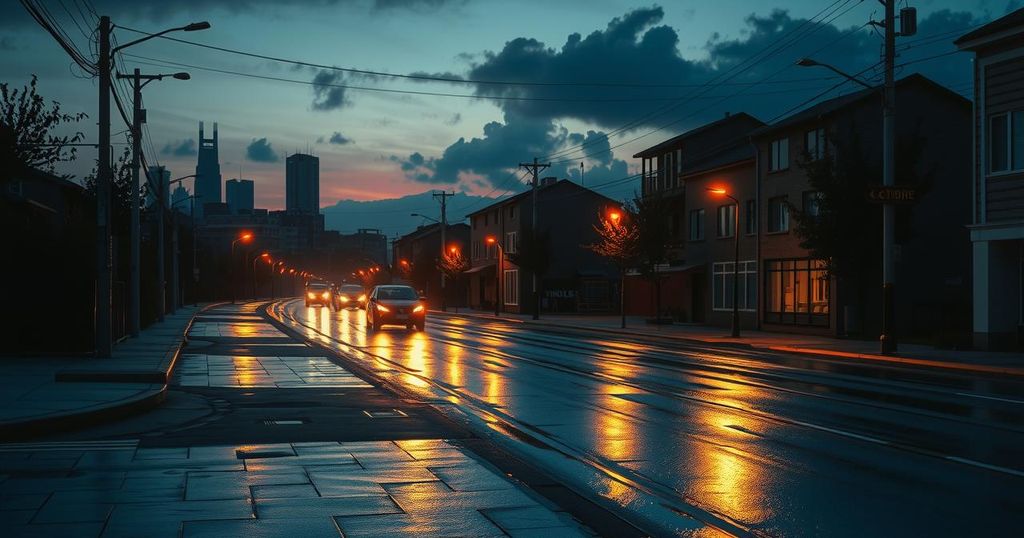Goma, once a vibrant city, is now under the control of the M23 rebel group following violent clashes that resulted in at least 700 deaths and numerous injuries. The local population is grappling with fear and disruption in daily life, as medical facilities struggle to cope with the influx of wounded. The government accuses the M23 of illegitimately occupying territory with foreign support, while this conflict threatens to spread further into other regions.
Upon entering Goma, a city in eastern Democratic Republic of Congo, one might not immediately perceive it as a conflict zone due to the bustling streets filled with daily activities. However, the façade quickly diminishes upon encountering the presence of the M23 rebel group, which recently captured the city, disrupting the previously held Congolese government authority. The recent conflict led to significant casualties, with estimates of at least 700 dead and close to 3,000 injured due to intense battles between the M23 rebels, allied forces, and the Congolese army.
The M23, primarily composed of ethnic Tutsis, claims to be fighting for minority rights, while the Congolese government accuses them of pursuing control over the region’s rich mineral resources, with alleged backing from Rwanda. At a nearby checkpoint, M23 fighters conducted security checks without encountering resistance, suggesting their total control over the city. As I visited one of the few operational hospitals, I was met with the heart-wrenching cries of the injured, revealing the human toll of the conflict.
Dr. Nathaniel Cirho, now a patient himself, recounted his injuries sustained from nearby bomb shrapnel, lamenting the loss of a 65-year-old neighbor who succumbed to his injuries. Another patient, an elderly woman, described her experience of self-administering care after being shot, emphasizing the desperate medical situation in Goma. Hospitals are overwhelmed, with reports of hospitals treating more than 700 patients as they combat severe war injuries, including gunshot wounds.
The ongoing violence has led to warnings from the UN regarding the use of sexual violence as a weapon, which has been tragically confirmed by medical professionals treating victims of gender-based violence. Although the intensity of gunfire has diminished, many shops in Goma remain closed, and residents express fear, evidenced by one shop owner who stated, “People are afraid because those who caused the tension are still with us.” This unease is exacerbated as trade routes to neighboring areas are impeded, leading to economic stagnation.
The M23 rebels ambitiously seized the office of the North Kivu military governor during their advance, further solidifying their dominance in Goma. Throughout my visit, I observed a complete absence of Congolese soldiers, which was starkly contrasted by abandoned military vehicles, highlighting a collapse of the official defense forces. Local residents recounted how many soldiers fled or changed into civilian attire when the M23 arrived, conveying the chaotic state of security.
Despite the Congolese government asserting that M23 illegally occupies their territory, the rebel group has moved southward, potentially threatening more regions, including Bukavu and Kinshasa. As Goma currently represents the M23’s most significant conquest, its situation serves as a potential precursor for future unrest in the larger Congolese context, with implications for numerous civilians as conflict continues to unfold.
The conflict in eastern Democratic Republic of Congo has deep historical roots, primarily stemming from ethnic tensions and struggles for power and control over valuable natural resources. The M23 rebel group emerged from prior conflicts, including the Rwandan Genocide aftermath and the continuing cycle of violence in the region, which has seen various armed groups vying for dominance. The UN has been involved in peacekeeping operations to stabilize the region but faces challenges in protecting civilians amidst ongoing violence. The recent capture of Goma by the M23 has significantly escalated tensions and triggered humanitarian crises, drawing international attention to the deteriorating situation within the DRC.
The current situation in Goma underscores the profound impact of armed conflict on civilians, from significant casualties to crippling economic conditions and extensive psychological trauma. The M23’s control over the city exemplifies the ongoing struggle for power, deepening ethnic divisions, and the urgent need for effective governance and security measures. The international community’s response will prove critical in addressing the humanitarian needs and stabilizing the region to prevent further escalations.
Original Source: www.bbc.com






